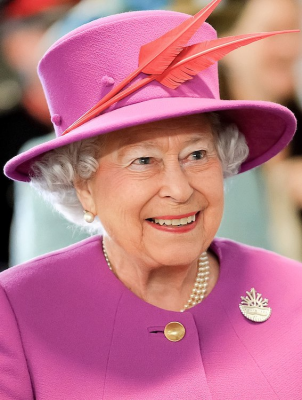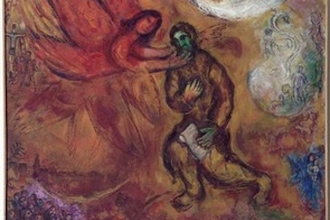Sunday Reflection with Canon Robin Gibbons - September 11th 2022

Queen Elizabeth II March 2015. Image Open Government Licence v3.0
Twenty-fourth Sunday in Ordinary Time
In Memory of our late Queen Elizabeth II.
Whilst the world must go on, the events of the past few days here in the United Kingdom with the death of Queen Elizabeth II at Balmoral on September 8th and the Accession of our new King Charles III, have upturned normal life for many.
This is only to be expected, the death of our longest lived Monarch, much loved and respected has created a hole in the emotional life of our country. t=There are very few who have not expressed a sense of shock and loss, those that object to monarchy and all they consider it stands for can be quite vitriolic in their comments, but I also see that type of anti-comment as the antithesis of the outpourings of grief, for like it or not, the death of The Queen has affected all of us. In this the rituals of grief and loss, and the words of faith about life and death are crucially important, we, like any who have lost somebody, need that time to grieve, reflect, and take time to place ourselves before Christ's love.
We can be excused therefore in not being totally liturgically focused this Sunday, yet even at this time the words of our Gospel give us something constructive and positive to hold on to. The shorter form of Luke's Gospel reading today (Lk 10:1-10) with its two parables of a good shepherd seeking the lost sheep and then of the woman seeking her lost coin, invites our accompaniment in this task of reaching out, then when all is done to rejoice at their recovery. This goes the heart of what we heard of Our Queen's commitment to God and her people made as a promise over 70 years ago...'that my whole life whether it be short or long be devoted to your service'. In this task, The Queen as with so many other people who have vowed or promised to serve others, cannot achieve much alone. For her, faith was important (as we now have heard it is for our new King) but she also knew that she must ask and receive that assistance from others:' But I shall not have strength to carry out this resolution alone unless you join in with me, as I now invite you to do: I know that your support will be unfailingly given'.
Without that support and sharing, her reign would have been very different. But it is striking, isn't it, how in her words we can hear those of Christ as told to us by St Luke, of somebody prepared to be that seeker of the little and lost, to go the extra mile, of defying opinion to reach out to others, and then in that humility enjoined on us by Christ to call others to share and rejoice in what has been done.
If we read the longer form (Lk 15:1-32), the tenor of our reflection may take us into many known but also hidden things never told about Queen Elizabeth, for in the parable of the merciful father and the prodigal son many of us will make some very direct links with the example of mercy she has definitely shown. This is not to make of her a saint above us, but to reflect that in this time of grief and profound change, her life exemplifies, writ large on the public stage, what so many of us also do in other ways, live out that commandment to love God and our neighbour as ourselves.
If anything these three parables take on a different resonance, at least for me today. I see in my mind's eye The Queen year in year out serving us tirelessly. Faults she had, for all of us mortals sin and fail, but if anything, as with the voice of `Jesus in these three tales, we hear in her life the voice of `Christ who wipes away tears, who forgives sin,' who before we have even time to apologise or repent has come to us and embraced us in merciful love.
All of us are at some time, the younger son or the older brother, but we are also the merciful and foolish father who knows the only way to help bring somebody back is unconditional love. Elizabeth II teaches us through her deep love of Christ, how in one way, she tried to be faithful to her vow and to her God.
It is good in reflecting upon her life and of our own relationship with her that this Sunday's readings from Luke give us an opportunity to see in one disciple of Christ this lived out very publicly, in her 2000 Christmas Broadcast she shared with us this: 'To many of us, our beliefs are of fundamental importance. For me, the teachings of Christ and my own personal accountability before God provide a framework in which I try to lead my life. I, like so many of you, have drawn great comfort in difficult times from Christ's words and example.'
I, and I hope you, will take both comfort and encouragement from her, that our faith can be lived out in public, that professing Christ will help others find him and that the Gospel is ever new.
In thanking her for all she gave, we also praise the One she now journeys towards, who, like the father in our Gospel runs to meet her, as will also happen for us, when we finally go home! Let these words from her Christmas broadcast of 2014 help us as we live out this Gospel of reconciliation : 'For me, the life of Jesus Christ, the Prince of Peace, whose birth we celebrate today, is an inspiration and an anchor in my life. A role model of reconciliation and forgiveness, he stretched out his hands in love, acceptance and healing. Christ's example has taught me to seek to respect and value all people of whatever faith or none.' - From The Queen's Christmas Message, 2014.
Amen
Memory eternal. May she rest in peace!
Lectio divina
Queen Elizabeth II On Faith
"For me, as a Christian, one of the most important of these teachings is contained in the parable of the Good Samaritan, when Jesus answers the question, 'Who is my neighbour?' It is a timeless story of a victim of a mugging who was ignored by his own countrymen but helped by a foreigner - and a despised foreigner at that. The implication drawn by Jesus is clear. Everyone is our neighbour, no matter what race, creed or colour. The need to look after a fellow human being is far more important than any cultural or religious differences" (Christmas message, 2004).
"Although we are capable of great acts of kindness, history teaches us that we sometimes need saving from ourselves - from our recklessness or our greed. God sent into the world a unique person - neither a philosopher nor a general, important though they are, but a Saviour, with the power to forgive... It is my prayer that on this Christmas day we might all find room in our lives for the message of the angels and for the love of God through Christ our Lord" (Christmas message, 2011).
"At the heart of our faith stands not a preoccupation with our own welfare and comfort but the concepts of service and of sacrifice as shown in the life and teachings of the one who made himself nothing, taking the very form of a servant." (2000)
"Everyone is our neighbour, no matter what race, creed or colour."


















